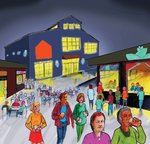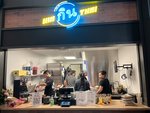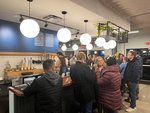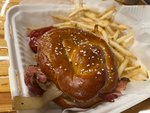







Eric Mizga sat sipping a beer from the Grand Bar inside Lansing Shuffle.
“It’s phenomenal,” Mizga pronounced the makeover of the city-owned downtown pole barn along the Grand River. “It’s a great space for Lansing. We needed something new. Nice atmosphere, very open and welcoming.”
Added Manny Rios, Mizga’s friend and Lansing resident, “It’s gonna be fun for Lansing, definitely.”
When asked if they would come back, Rios replied, “Definitely. Every week.”
“I’ll be here tomorrow night,” Mizga said, laughing.
The building, which opened to the public last Thursday, houses five restaurants (with space for two more), a bar, a private event space and, come summer, a covered pavilion with a bar, five shuffleboard courts and a patio extending to the riverfront.
The space was formerly home to the Lansing City Market, which has a storied past. Established in 1909, the city-sponsored farmers market spent 29 years outdoors at the intersection of Shiawassee Street and Grand Avenue before moving into a building across the Grand River off of Cedar Street in 1938. It was built by employees of then-President Franklin Roosevelt’s Works Progress Administration, a New Deal agency that gave post-Depression era citizens jobs carrying out public works projects.
There was a celebration for the new market’s opening, which Carrie Lewis Wales, who attended the party, told City Pulse in 2009 “was so crowded you could hardly move.” The market continued to be crowded for years to come, with customers “filling the parking lot and lining up for fresh produce and other goods,” City Pulse reported in 2007.
“You couldn’t even get to the tables,” longtime customer Dave Mackey said.
However, with the rise of supermarkets later in the century, followed by big-box stores like Walmart and Meijer, the market grew less and less popular as time went on.
“It’s been limping along for years,” former Lansing Mayor David Hollister told City Pulse in 2007.
In addition, the building needed a major renovation — it faced “over $1.2 million in maintenance problems, including shredded awnings, crumbling masonry, an aging roof and air conditioning unit, a patchy parking lot and termite problems,” the story said.
In October 2007, developer Pat Gillespie announced his plans to replace this building with a smaller, more cost-efficient and modern facility closer to the Grand River that would also offer entertainment and events. Apartments, retail stores, offices and restaurants would take over the old site, bringing commerce and potential new customers to the area.
He was met with mixed feelings: Some thought this was a Hail Mary for the market, its only chance to stay afloat. Others fought to save the nostalgic old building, fearing gentrification and the loss of tried-and-true, local vendors.
Getting the plan approved was a long process involving “many meetings, public and otherwise, and many levels of government,” City Pulse reported in 2008. Gillespie and Bob Trezise, former CEO of the Michigan Economic Development Corp., held more than 50 public meetings to convince concerned parties that the development was the best direction. The project eventually ended up in the hands of the Lansing City Council, which approved it unanimously after arguments over “holes” in the development agreement, including the selling price of $1.6 million, the amount of tax incentives Gillespie was eligible for and questions over what, exactly, he was going to build.
Despite controversy, the large pole barn opened in January 2010, with a grand opening on April 24. Initially, the market saw a rise in customers following the move. Fruit vendor Kevin Nichols told City Pulse in September 2010 that his business had “close to tripled.” Younger, more culturally adept patrons flocked to the new digs, purchasing food from vendors and the newly opened Waterfront Bar & Grill, kayaking on the river and enjoying live entertainment.
In 2014, however, vendors began to voice concerns, especially about a lack of parking. There were only 55 spaces for the entire market, which some worried kept potential drive-in customers from shopping there.
Though Gillespie eventually made good on his plans for the Marketplace apartments, Midtown mixed-use development on Michigan Avenue and Stadium District, attendance and vendors continued to decline. City Pulse asked readers what they thought the market could do to gain more traction. Respondents said increased advertising and later hours could help, though the rise of competing farmer’s markets did not bode well.
In summer 2015, the Lansing Entertainment and Public Facilities Authority, which oversaw the building, announced plans for an “urban market” to replace the obviously tired farmers market concept with more emphasis on restaurants, prepared food, specialty food stands and even a potential brewpub.
In the end, though, nothing could save the floundering establishment. In 2018, the City Council began considering ending its $80,000-per-year subsidy to the market, with Council President Carol Wood calling it a “failure.” The market was at about 60% occupancy at the time, though Waterfront was taking up a large chunk. The restaurant’s lease expired and the city eventually evicted it from the market after a lengthy legal battle with its owner.
Residents had many ideas for the future of the pole barn, including a welcome center for the city, a marijuana marketplace and an advocacy center for homeless populations.
Mayor Andy Schor issued a request for “actual, developed proposals,” and for a while, it looked like Grand River Brewery of Jackson was going to cut a deal. That never came to fruition, though.
Finally, in the fall of 2020, the City Council approved a 40-year lease agreement with Detroit Rising Development, and Lansing Shuffle was born. The $3.2 million development saves the city around $80,000 annually in utility and maintenance costs it was previously covering and hopes to bring in more customers and profits than the building’s previous tenant.
This is co-owners Jonathan Hartzell and Jim Therkalsen’s first project outside of metro Detroit, and they hope to bring the vibe of the successful Detroit Shipping Co. to the capital city.
“Here, I think what intrigued me was the location on the riverfront,” Therkalsen told City Pulse in 2022. “It’s just an awesome location, right along the Riverwalk, Rotary Park, with the stadium and convention center. It feels like the space wasn’t being used, and development is something that could bridge all those different points of interest.”
The 11,000-square-foot building holds five restaurants, a full-service bar, a private event space and upscale food court-style seating where guests can eat, chat with friends and enjoy drinks. It also offers parking validation for up to two hours for the lot south of the building, though rates are pretty fair if you choose to stay longer.
The owners also plan to bring art, music and comedy events, classes, pop-up retail and more to the venue.
The space is open for bookings — from the private lounge to the entire property. “Whether you’re hosting a meeting, happy hour, dog-walker meet-up, charity ball, Magic: The Gathering tournament, tailgate before a Lugnuts game, speed dating event or a large corporate event,” the website states, the Shuffle hopes to host all kinds of events, with catering menus from each restaurant and cocktails delivered from the bars. Construction for the outdoor pavilion, with five shuffleboard courts, a bar and riverfront patio, is slated to begin in the spring. Once completed, it will host shuffleboard leagues and private court bookings. But don’t worry, there will still be plenty of opportunities to play a casual game with friends over drinks.
At Thursday evening’s grand opening, wide-eyed and empty-stomached patrons lined up to sample offerings from the restaurants, including Yeti Kitchen, which serves vegetarian, vegan and gluten-free Nepalese food such as butter chicken and paneer, samosas, dumplings and stuffed naan bread; Irie Smoke Shack, a fragrant-smelling Caribbean barbecue stand with options like curry-spiced chicken wings, jerk-rubbed ribs, harissa-smoked turkey breast and smoked beef brisket; and Kin Thai, offering classic noodle dishes such as pad Thai, orange chicken, fried shrimp in sweet chili sauce, crab rangoon “nachos” and various boba teas.
Brian Scherle, co-owner of Browndog at the Shuffle, stood outside of his kitchen to greet passers-by. The company is based in Detroit, but Scherle and his partner are looking forward to introducing the people of Lansing to their menu of American classics like burgers, fries and ice cream with elevated ingredients and flavor profiles.
“We don’t have that opportunity from southeastern Michigan. So, I think, goal-wise, that’s what we’re looking for,” Scherle said. “And to have a good collaboration with all the other restaurateurs and the group that’s here.”
“It’s a great opportunity, a great new market, a city that’s waiting for a food scene and an amazing part of the political and cultural landscape of Michigan,” he added. “So, we’re super excited to be down here for it.”
Chef Gianmarco Roselli, owner of Osteria Vegana, an Italian restaurant serving plant-based and gluten-free pastas, salads and antipasto, is equally excited to bring his business to Lansing to offer more options to residents with limited diets.
“Mainly, what our goal is always to do is to offer exceptional, life-changing service and food, because we know how many people have gluten-free and vegan dietary restrictions,” he said. “We would like to make sure that everybody gets what they need. We want everybody to enjoy vegan and gluten free-food. So, that’s our main goal, to keep giving you five-star service and food.”
The concept for the restaurant was formed after he “fired” himself from a burger joint over a discrepancy on how to flip hamburgers.
“The same day, I made this concept for Osteria Crema, which was originally vegetarian. Then I went to retreats in Mexico and Egypt, both of which made me do fasting, and there I learned I wanted to be vegan. So, we changed the concept and launched Osteria Vegana,” he said. “We were the second person to sign up. We get to be in this Lansing Shuffle every day, and we made friends with all the patrons and kind of grew into a big family. We’ve been loving it. It was pretty fated, the way it happened.”
With the huge turnout, wait times were relatively long, but guests didn’t seem to mind — they chatted with friends, ordered drinks from the bar and took in the musical stylings of Detroit’s Paxton/Spangler Quintet while waiting for texts alerting them that their food was ready.
“I had no idea what to expect,” Scherle said, “But I think, from the turnout tonight, it looks like people have been waiting for this to happen.”
Matt LoRusso, the quintet’s guitarist, used to play at the City Market while attending Michigan State University’s jazz studies program.
“I loved it back then, but it didn’t have this kind of an appeal or draw,” he said. “It’s great to see the space being repurposed with community-accessible restaurants and everything. Judging by the success of Detroit Shipping Co., I’m sure it’s gonna be the same thing and busy all the time here.”
Lansing resident Ben VanderStarre agrees that the renovation was the best move for the space.
“What it was before kind of felt like a little bit of a waste, personally,” he said. “I think it’s great. A lot of vendors can get in here — especially if you’re a food truck or something, that gives you a lot more access to people — and it gives a little more back to the community.”
VanderStarre gave a rave review of Browndog’s beer cheese burger, which was high praise coming from a self-proclaimed “burger guy.”
“It’s awesome. The (pretzel) bun was great. Usually, buns are alright, but the salt on top made the rest of the burger kind of combine. And it wasn’t just normal ketchup or anything like that, there was some aioli, so it was great,” he said.
Overall, patrons were more than happy with the new venture.
“It’s very big and expansive, which is nice. There’s a lot of different (food) options and music, so I like that,” said Christine Carmichael of Lansing. “I think it’s very unique in Lansing. I don’t think we have a space that has this many different types of options for food and drink and this much space to hang out in.”
“I just got finished with a whole week of classes and labs and stuff, and I was just like, ‘I need this moment, I want to go eat some delicious food from several vendors at the same time,” said Lansing resident Zack Phillips. “I like that everything is within a space that kind of collaborates with each other. Also, I don’t have to deal with being outside right now.”
Both Carmichael and Phillips said they hope to see more musicians and events at the space in the future.
Referring to a Michigan Avenue establishment, “It’s comparable to The Avenue, where they have that food kitchen, they have a bar, they have events, so I’d love to see that potential tapped into here, where they’re able to bring in karaoke nights and hang out nights and stuff like that,” Phillips said.
Support City Pulse - Donate Today!
Comments
No comments on this item Please log in to comment by clicking here